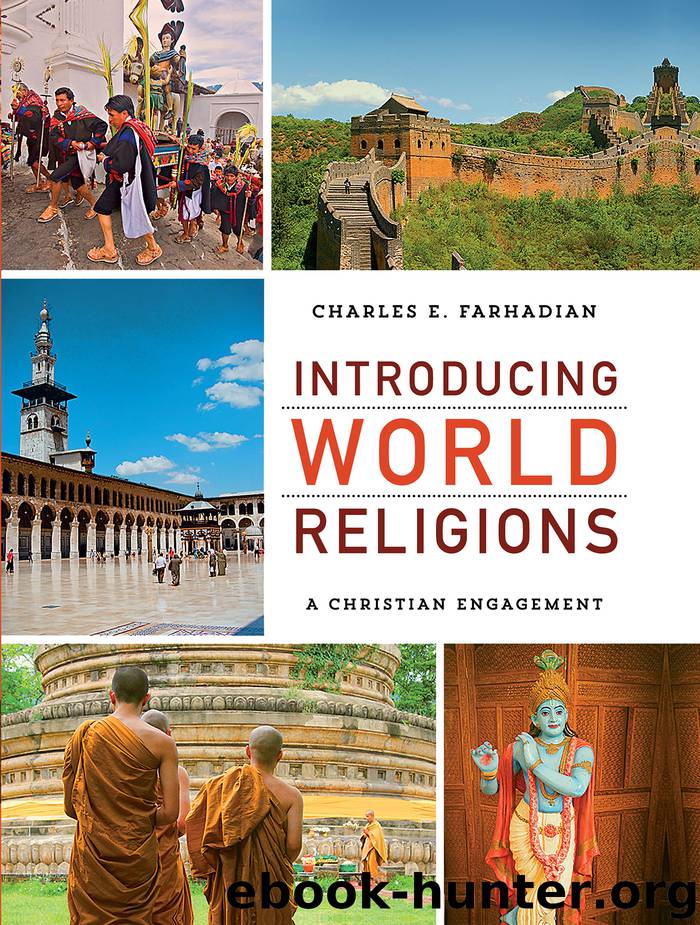Introducing World Religions by Charles E. Farhadian

Author:Charles E. Farhadian [Farhadian, Charles E.]
Language: eng
Format: epub
Tags: REL017000, REL054000, Religions, Christianity and other religions
ISBN: 9781441246509
Publisher: Baker Publishing Group
Published: 2015-04-14T16:00:00+00:00
Figure 7.2. Abraham and Isaac, sixteenth century, from Church of the Madeleine, Troyes, France
Vassil/Wikimedia Commons
Basic Teachings of Judaism
Jews trace their history back to the biblical characters of Adam and Abraham, whose wife Sarah gave birth to Isaac. Among Isaac’s progeny was Jacob, the grandson of Abraham, who became the father of the Israelites. Early biblical accounts refer to Abraham as “Abram the Hebrew” (Gen. 14:13). It is notable that one definition of the term “Hebrew” means “the other side” and communicates that Abraham came from the other side of the Euphrates River.
Usually the terms “Hebrews” and “Israelites” refer to the same people, with the term “Hebrew” used to describe them before the conquest of the land of Canaan, and the term “Israelite” afterward. The term “Jews” (Hebrew, Yehudim) describes an ethnic and religious group originating from the Israelites and Hebrews of the ancient Near East. Given that there were originally twelve tribes of Israel, Judah being one of them that survived, the term “Jews” is directly related to “Hebrews.” The term “Jew” refers to the descendants of the tribe or kingdom of Judah (see Jer. 32:12; 34:9). After the Babylonian exile, when the “Hebrews” were taken into exile in Babylon, the term “Jew” came to describe God’s covenant people.
NAMES FOR GOD
Jewish belief affirms the existence of one God who created heaven and earth: “the earth was a formless void and darkness covered the face of the deep, while a wind from God swept over the face of the waters” (Gen. 1:2). A crucially important name for God is Yahweh (YHWH), the God who demanded that people worship God alone. Yahweh means, “I will be what I want to be” or “I am that (or who) I am,” or simply, “I am,” as in “I AM WHO I AM” (Exod. 3:14). For many early followers, and even today’s strongly Orthodox Jews, God’s name was so holy that verbalizing it was considered a sin. Only the high priest, according to Jewish law, could pronounce the Tetragrammaton, the four-letter word “YHWH” (Yahweh), once a year on Yom Kippur, the most important holiday set aside in the Jewish calendar to repent for the sins of the past year.
God is so unique that a depiction of God cannot be made (Exod. 20:4). The Hebrew Bible describes God as all-knowing (omniscient) (Job 28:23), all-powerful (omnipotent) (Job 42:2), and present everywhere (omnipresent) (Ps. 139:7–12). God is eternal (Isa. 40:6–8) and unchangeable (Isa. 41:4). As its Creator, nature reveals the glory of God (Ps. 19:2), even while God remains distinct from and involved in creation itself.
Download
This site does not store any files on its server. We only index and link to content provided by other sites. Please contact the content providers to delete copyright contents if any and email us, we'll remove relevant links or contents immediately.
Periodization Training for Sports by Tudor Bompa(8238)
The Body: A Guide for Occupants by Bill Bryson(5066)
The MacArthur Bible Commentary by John MacArthur(4814)
The Sports Rules Book by Human Kinetics(4369)
What It Really Takes to Get Into Ivy League and Other Highly Selective Colleges by Hughes Chuck(3732)
Marijuana Grower's Handbook by Ed Rosenthal(3662)
The Sprouting Book by Ann Wigmore(3576)
The Martian by Andy Weir(3395)
Salt, Fat, Acid, Heat: Mastering the Elements of Good Cooking by Nosrat Samin(3134)
The Bread Bible by Rose Levy Beranbaum(3058)
Sapiens and Homo Deus by Yuval Noah Harari(3053)
Harry Potter 4 - Harry Potter and The Goblet of Fire by J.K.Rowling(3048)
The Marketing Plan Handbook: Develop Big-Picture Marketing Plans for Pennies on the Dollar by Robert W. Bly(3030)
Classic by Mary Berry(3001)
Martha Stewart's Baking Handbook by Martha Stewart(2847)
Screenplay: The Foundations of Screenwriting by Syd Field(2623)
The Plant Paradox by Dr. Steven R. Gundry M.D(2597)
50 Economics Classics by Tom Butler-Bowdon(2557)
The Cambridge Grammar Of The English Language by Rodney Huddleston Geoffrey K. Pullum(2411)
